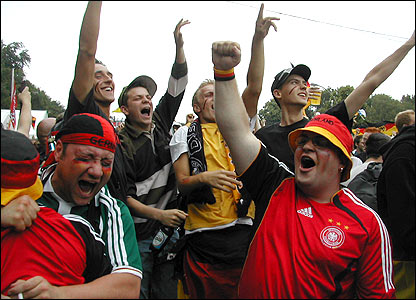Cliffhangers Can Triple The Risks Of A Heart Attacks – Study
 A new study published in the England Journal of Medicine has found watching a cliffhanger or stressful game can triple the risk of a heart attack or irregular heartbeat in male fans. The study articulates that emotional rollercoaster ride brought about by the thrill of victory — or the agony of defeat — may cause heart attacks.
A new study published in the England Journal of Medicine has found watching a cliffhanger or stressful game can triple the risk of a heart attack or irregular heartbeat in male fans. The study articulates that emotional rollercoaster ride brought about by the thrill of victory — or the agony of defeat — may cause heart attacks.
The study by doctors Ute Wilbert-Lampen and David Leistner from the Ludwig-Maximilians- Universitaet in Munich, focused on the occurrence of heart emergencies during another major sports event — the 2006 World Cup, which Germany hosted in June and July of that year.
The researchers particularly concentrated on the number of cardiac events reported by German soccer fans who watched the games. They compared the number of heart emergencies in 4,279 men and women in Bavaria during three periods: when the German team played a match during the Football Association World Cup that was held in Germany from June 9 to July 9, 2006; when only foreign teams were involved; and when no matches took place.
They found that heart emergencies more than doubled on days the German team played. They found that German men watching the country's team play during the 2006 World Cup suffered 3.3 times more cardiac emergencies than patients examined when no matches took place.
Moreover, among men, the number of heart emergencies tripled on these days. In particular, the study suggests that the risk of heart attack increased by 250 percent and risk of irregular heartbeat increased by more than 300 percent for these fans.
According to the researchers, the highest number of cardiac emergencies was seen within two hours after the start of the match. The number of cases was higher than average for several hours before and after the game.
The higher risk factor seen in men may be explained by gender-specific physiological differences, differences in the degree of interest in soccer matches or vulnerability to emotional triggers, the researchers said.
The number of heart cases increased by 1.8 times in women, 3.3 times in men and by factor of 2.7 for men and women together when their team played. There was no additional risk on days when the German team was off.
The study found that the increase in the number of heart emergencies was the most pronounced during and after so-called knockout games when Germany beat Sweden on June 24, when it beat Argentina on June 30 in the quarterfinals after a dramatic penalty shoot-out or when it failed to qualify for the final after losing to Italy in the semifinals.
Wilbert- Lampen and Leistner wrote in their study, “Of prime importance for triggering a stress-induced event is not the outcome of a game - a win or a loss - but rather the intense strain and excitement experience during the viewing of a dramatic match, such as one with a penalty shoot-out.”
Preventive measures, which are particularly important for people with pre-existing heart conditions, may include the increased use of a range of different heart drugs and behavioral therapy for coping with stress, the doctors said.
According to Wilbert-Lampen and Leistner, the results of their study may have been affected by other factors that also contribute to heart disease; Fans might have been subject to risk factors such as lack of sleep, overeating, consumption of junk food, alcohol and smoking during the World Cup.
Wilbert-Lampen and Leistner decided to test the theory in Germany because soccer is very popular and World Cup matches involving the national team were thought to be strong enough to boost cardiac events.
So far, there is no study that shows definitively that fans of American football face these same heart risks. However, heart experts say it's likely — and that Sunday's culmination of the NFL season could pose a special risk for those who have heart issues.
Dr. Lori Mosca, professor of medicine and director of preventive cardiology at NewYork-Presbyterian Hospital and Columbia University Medical Center, say, "The excitement of watching the upcoming Super Bowl could put some individuals at risk of an acute heart problem including heart attack, death or an irregular heart rhythm."
Dr. Richard Luceri, a cardiac electrophysiologist and vice president of medical services for JM Family Enterprises in Deerfield Beach, Fla., say, "This new report is the first valid and statistically significant study verifying how high emotions and acute stress while watching major sporting events actually do increase the risk for heart emergencies."